|
|
|
Sort Order |
|
|
|
Items / Page
|
|
|
|
|
|
|
| Srl | Item |
| 1 |
ID:
151585
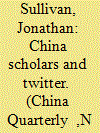

|
|
|
|
|
| Summary/Abstract |
Situating external engagement within the broader context of developments in Western higher education (HE) and technologies that are changing many aspects of academic life, this research note draws on the experiences of a large number of China scholars to assess the merits of Twitter for individual academics and the field as whole. Celebrating its tenth anniversary in March 2016, Twitter has shaken off its earlier image of celebrity stalking and inane ephemera and has become a tool used by many professionals working on China. Despite initial scepticism, many academics have recognized the utility of Twitter for various professional activities, including networking, increasing research visibility, gathering and disseminating information, and building a public profile. As external engagement activities become a routine expectation for academics in many Western universities, social media like Twitter have drawn attention as potentially useful tools. However, there are numerous obstacles to effective use, which this note addresses.
|
|
|
|
|
|
|
|
|
|
|
|
|
|
|
|
| 2 |
ID:
151584
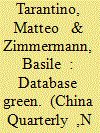

|
|
|
|
|
| Summary/Abstract |
Significant efforts towards environmental transparency have been made by the Chinese government since 2008. This paper focuses on the technical decisions shaping a database of official pollution information built and operated by a Chinese NGO known as the Institute of Public and Environmental Affairs (IPE). Issues of standardization, power distribution and institutional fragmentation are discussed. The paper illustrates a case of NGOs integrating enforcement capabilities as data centres amidst the growing reliance on processes of informational governance of environmental issues.
|
|
|
|
|
|
|
|
|
|
|
|
|
|
|
|
| 3 |
ID:
151580


|
|
|
|
|
| Summary/Abstract |
Despite strict state controls, negative news about local officials is reported in China. Faced with political constraints and the incentive and pressure to earn profits, municipal television news programmes have developed and adopted the life news model (minsheng xinwen), which aims to help citizens solve problems. The production process of this news model has transformed the political role of the broadcast media at the local level. Many life news reports focus on disputes between citizens and local officials. Thus, addressing citizen grievances essentially facilitates public service provision. Based on an ethnographic case study of a municipal television news programme, this article finds that the production process of life news reports can facilitate public service provision by correcting local officials’ behaviour, regardless of whether the news reports are eventually broadcast. This unintended role is a result of the power negotiation between local officials and journalists who face immense commercial pressure.
|
|
|
|
|
|
|
|
|
|
|
|
|
|
|
|
| 4 |
ID:
151583


|
|
|
|
|
| Summary/Abstract |
Relying on fieldwork conducted in two provinces, this article provides a systemic study of China's Government Work Reports (GWRs), examining their function, format, how they are formulated and implemented, their content and their research values. Whilst the existing literature mostly focuses on central government reports, this research integrates GWRs from all administrative levels. I argue that over time, the GWRs have developed into a highly institutionalized nationwide system with two important aspects – local elites’ autonomy in setting work agendas, and their compliance with central government policy priorities. Additionally, my study shows that by using quantifiable targets and celebrating achievements framed in concrete statistics, the GWRs help to sustain the legitimacy of the party-state. Finally, my study finds GWRs to be a versatile scholarly resource that can be used for various research interests and methods.
|
|
|
|
|
|
|
|
|
|
|
|
|
|
|
|
| 5 |
ID:
151582
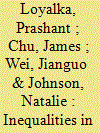

|
|
|
|
|
| Summary/Abstract |
Inequalities in college access are a major concern for policymakers in both developed and developing countries. Policymakers in China have largely tried to address these inequalities by helping disadvantaged students successfully transition from high school to college. However, they have paid less attention to the possibility that inequalities in college access may also arise earlier in the pathway to college. The purpose of this paper is to understand where inequalities emerge along the pathway to college in China, focusing on three major milestones after junior high. By analysing administrative data on over 300,000 students from one region of China, we find that the largest inequalities in college access emerge at the first post-compulsory milestone along the pathway to college: when students transition from junior high to high school. In particular, only 60 per cent of students from poor counties take the high school entrance exam (compared to nearly 100 per cent of students from non-poor counties). Furthermore, students from poor counties are about one and a half times less likely to attend academic high school and elite academic high school than students from non-poor counties.
|
|
|
|
|
|
|
|
|
|
|
|
|
|
|
|
| 6 |
ID:
151574


|
|
|
|
|
| Summary/Abstract |
This study draws on a case study of Wukan and interviews with migrants and peasants in other sites to examine how migration shapes popular resistance in migrant-sending communities (i.e. rural China). Findings demonstrate multidimensional roles played by migrants and returned migrants who act as a vehicle of informational and ideological transmission and at times directly participate in or even lead rural resistance in origin communities. Both the transmission and participation processes foster political consciousness and action orientations among peasants. The importance of migrants is exemplified in the Wukan protests but is also found in other settings under study. In general, migrants represent a latent political force that acts upon serious grievances back home. The findings provide a useful lens for understanding the diffusion of popular resistance and the linkage between urban and rural activism in China.
|
|
|
|
|
|
|
|
|
|
|
|
|
|
|
|
| 7 |
ID:
151578


|
|
|
|
|
| Summary/Abstract |
Chinese NGOs face strong coercive pressures and limitations yet have still emerged as notable actors in several issue areas. This article studies why and explains how a group of NGOs working on AIDS-related issues have been able to progress into relatively large and vibrant operations. It documents how NGO leaders have learned to navigate opportunities and risks, circumvent formal restrictions and broker pragmatic and largely informal arrangements that have enabled their organizations to grow and advance within China's authoritarian settings. The article contributes to the literature on Chinese NGO development and new institutionalism theory, and introduces a framework for studying NGOs based on their organizational forms and activities.
|
|
|
|
|
|
|
|
|
|
|
|
|
|
|
|
| 8 |
ID:
151581


|
|
|
|
|
| Summary/Abstract |
This article examines the parent–child relations within rural-to-urban migrant households to explore the continuations and changes in the patrilineal family system under the forces of migration and urbanization in late-socialist China. Based on ethnographic data collected between 2008 and 2015 in Shanghai, it takes a processual approach to understand son preference as a contextualized family practice and examines four aspects of parent–child relations in migrant households: reproductive strategy, childrearing practices, educational investment, and parental expectation of adult children. Through exploring intimate negotiations between migrant parents and their children over material and emotional resources at different life stages, this article demonstrates how the gendered parent–child relations in migrant households in Shanghai have been shifting away from the traditional focus on sons and gradually giving way to pragmatic adjustments and emotional redefinition under the forces of socialist institutions and capitalist markets.
|
|
|
|
|
|
|
|
|
|
|
|
|
|
|
|
| 9 |
ID:
151579
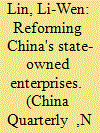

|
|
|
|
|
| Summary/Abstract |
The Chinese Communist Party has recently unveiled its new agenda for state-owned enterprise (SOE) reform. Most attention to date has focused on structural reform through the so-called “mixed ownership” policy. This article is to direct attention to a critically important yet much less analysed item on the SOE reform agenda: the professionalization of the SOE executive personnel. This article provides an empirical study on the managerial elite of China's financial and non-financial SOEs. The findings suggest a politically constrained management approach in the Chinese state-owned sector. Moreover, an innovative analysis of the SOE executive career patterns reveals that the state-controlled banks and industrial SOEs employ divergent human resource management methods. The anatomy of the SOE managerial elite in this article provides a timely evaluation of the recent SOE reform policy and a richer understanding of China's state-owned sector from a comparative capitalism perspective.
|
|
|
|
|
|
|
|
|
|
|
|
|
|
|
|
| 10 |
ID:
151576


|
|
|
|
|
| Summary/Abstract |
This paper explores the role of guanxi, particularly in its special form of tunqin, in building rural resilience in a poverty-stricken county in north China. The emphasis of this paper is placed on the nature and function of such guanxi. By presenting how guanxi is maintained, this paper also analyses the impact and effectiveness of local guanxi as a strategy to cope with poverty. Whereas tunqin guanxi appears to have built rural resilience in order to cushion villagers against life's upheavals, the maintenance of rural guanxi diminishes this resilience as scarce resources are spent on the exchange of cash gifts, thus aggravating local poverty.
|
|
|
|
|
|
|
|
|
|
|
|
|
|
|
|
| 11 |
ID:
151577
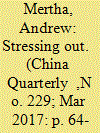

|
|
|
|
|
| Summary/Abstract |
Might authoritarian one-party systems experience something akin to party identification – or affective proximity to the Party – that waxes and wanes over time? Such cycles do not centre on elections but on the politics of succession, new policy initiatives and ad hoc housecleaning, and their focus would be officials within the system as opposed to the electorate outside it. I argue that a key mechanism animating such variation in party identification of Chinese Communist Party (CCP) cadres lies within the recurring rectification efforts seeking to temper these individuals and make them more submissive to the larger political goals of the Party centre. Such priming is largely an in-house phenomenon, taking place increasingly deeper within the CCP apparatus. This process tends to involve an extensive arsenal of institutional mechanisms that constitute a particularly big stick and within which pressures to comply can be uncomfortable, even excruciating. Normative elements of these movements, such as the language and substantive written materials used during study, analysis and self-criticism are predominantly in the service of enhancing the sheer domineering quality of the Party vis-à-vis the individuals that make up its ranks. I explore this through an examination of the three stresses (san jiang) campaign of 1998–2002.
|
|
|
|
|
|
|
|
|
|
|
|
|
|
|
|
| 12 |
ID:
151575


|
|
|
|
|
| Summary/Abstract |
This case study of Gao Village has two aims: to provide an update on Gao Village since 1997, when Gao Village (Gao 1999, 2014) leaves off, and to ponder the future direction of rural China. The article begins with an update on the development of Gao Village from the late 1990s up to 2015, dealing with several major thematic topics such as demography, family and marriage, living standards, education and health care. Using empirical evidence gathered during several years of fieldwork as background, the paper then moves on to discuss the future direction of rural China. This second part covers the current intellectual and policy debate on two crucial issues: land ownership and urbanization. The paper concludes that the Chinese state is still undecided on a grand narrative: whether to travel further in the direction of full-scale capitalism or whether to retain some kind of socialist collectivism.
|
|
|
|
|
|
|
|
|
|
|
|
|
|
|
|
|
|
|
|
|